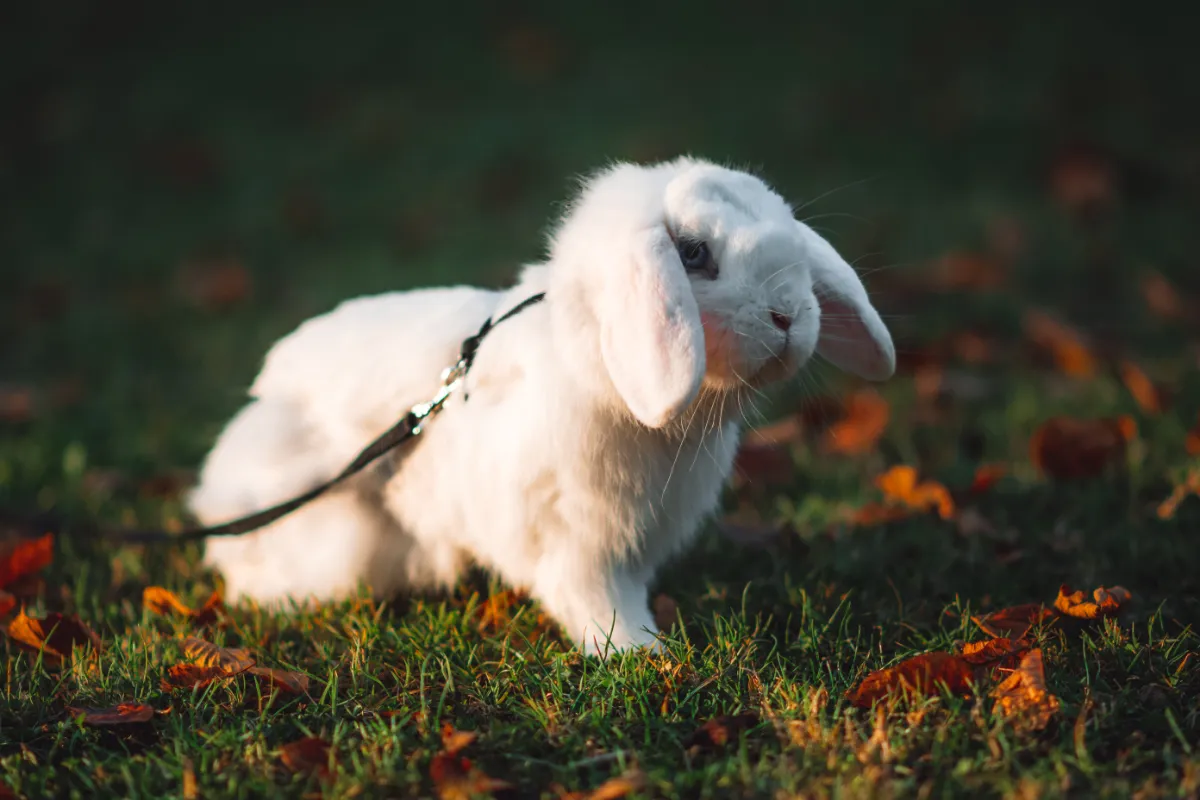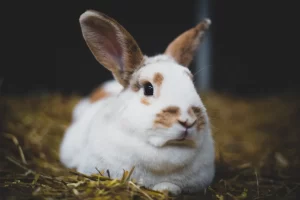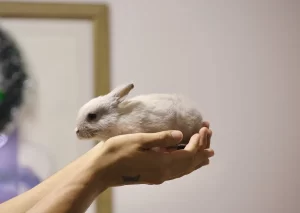Are you wondering if it’s safe to let your rabbit roam free at night? Well, you’re not alone. Many rabbit owners ponder over this question.
In this article, we’ll explore the importance of rabbit safety at night and discuss the potential dangers that free-roaming rabbits may face. We’ll also provide tips on creating a safe environment for your furry friend and offer alternatives to letting them roam free.
So, let’s dive in and ensure the well-being of your beloved rabbit!
In This Article
- 1 Key Takeaways
- 2 The Importance of Rabbit Safety at Night
- 3 Understanding the Natural Behavior of Rabbits
- 4 Potential Dangers for Free-Roaming Rabbits
- 5 Creating a Safe and Rabbit-Friendly Environment
- 6 Alternatives to Letting Your Rabbit Roam Free at Night
- 7 Monitoring Your Rabbit’s Nighttime Activities
- 8 Consulting With a Veterinarian for Guidance
- 9 Frequently Asked Questions
- 9.1 How Can I Train My Rabbit to Stay Indoors at Night?
- 9.2 Are There Any Specific Breeds of Rabbits That Are More Suitable for Free-Roaming at Night?
- 9.3 What Are Some Common Health Issues That Can Arise From Letting a Rabbit Roam Free at Night?
- 9.4 Can Rabbits Be Trained to Use a Litter Box if They Are Allowed to Roam Free at Night?
- 9.5 Are There Any Potential Legal Issues or Regulations Regarding Letting Rabbits Roam Free at Night in My Area?
- 10 Conclusion
Key Takeaways
- It is important to ensure the safety of the rabbit by checking for potential hazards in the yard before letting them out at night and providing a secure, enclosed space for exercise.
- Understanding the natural behavior of rabbits, such as their social nature and complex foraging behavior, can help in providing appropriate care and promoting their well-being.
- Creating a safe environment for the rabbit includes protecting them from outdoor predators, traffic hazards, and exposure to harmful substances, as well as providing a comfortable shelter and proper enrichment.
- Alternatives to free-roaming at night include setting up a secure playpen indoors, hutch training, and playpen confinement, which offer controlled environments for exercise and play while promoting safety.
The Importance of Rabbit Safety at Night
You should always remember to check for any potential hazards in your yard before letting your rabbit out at night. Nighttime predators pose a significant threat to your rabbit’s safety, so it’s crucial to take precautions.
Start by ensuring that there are no openings in your yard’s fence or any other escape routes. Additionally, remove any toxic plants or chemicals that could harm your rabbit.
It’s also important to consider the weather conditions. Extreme temperatures, rain, or strong winds can make your rabbit vulnerable to illness or injury.
If you live in an area with a high predator population, it’s advisable to provide a secure, enclosed space for your rabbit to exercise in during the night.
Understanding the Natural Behavior of Rabbits
Certainly, it’s interesting to explore how rabbits instinctively communicate through body language and vocalizations. Understanding the natural behavior of rabbits can greatly enhance our ability to care for them.
When it comes to social interactions, rabbits are highly social animals. They form strong bonds with their companions and communicate through various behaviors such as nose nudging, grooming, and even laying their heads on each other.
Additionally, rabbits exhibit complex foraging behavior in the wild. They’re natural grazers and spend a significant amount of time searching for food. This behavior can be replicated in captivity by providing them with hay, fresh vegetables, and stimulating toys that encourage foraging.
Potential Dangers for Free-Roaming Rabbits
Be mindful of the potential hazards that can arise from allowing your rabbit to roam freely, such as outdoor predators and traffic hazards. While it may seem like a good idea to let your rabbit explore the outdoors, it is important to consider their safety first. Outdoor predators, such as foxes or birds of prey, pose a significant threat to your rabbit’s well-being. Additionally, traffic hazards can be extremely dangerous, as rabbits are small and can easily be injured or killed by passing cars.
To help you make an informed decision about whether to let your rabbit roam free, here is a table outlining the potential dangers and precautions to take:
| Potential Dangers | Precautions |
|---|---|
| Outdoor Predators | Provide a secure enclosure or supervise your rabbit while outside. |
| Traffic Hazards | Keep your rabbit in a safe, enclosed area away from roads. |
| Exposure to Harmful Substances | Remove any toxic plants or chemicals from the area your rabbit will be in. |
Creating a Safe and Rabbit-Friendly Environment
To create a safe and rabbit-friendly environment, make sure to provide proper shelter and secure fencing to protect your furry friend from potential dangers. Rabbit proofing your home is essential to ensure their safety and well-being. Here are some key tips to consider:
- Shelter:
- Provide a spacious and comfortable hutch or cage for your rabbit to retreat to.
- Ensure it’s well-ventilated and protected from extreme temperatures.
- Secure Fencing:
- Install sturdy fencing around your rabbit’s outdoor play area to prevent escape and keep out predators.
- Make sure the fencing is buried at least 6 inches deep to prevent digging.
In addition to creating a safe environment, providing proper enrichment for your rabbit is crucial for their mental and physical stimulation. Some enrichment ideas include:
- Toys and Chews:
- Offer a variety of toys and chews to keep your rabbit entertained and prevent boredom.
- Provide safe chew toys to satisfy their natural urge to chew.
- Playtime and Exercise:
- Allow your rabbit daily supervised playtime outside of their enclosure.
- Set up tunnels, ramps, and obstacles to encourage exercise and exploration.
Alternatives to Letting Your Rabbit Roam Free at Night
If you’re concerned about the safety of letting your rabbit roam free at night, you can consider setting up a secure playpen indoors or confining them to a designated area with a pet gate. Hutch training is an important aspect of ensuring your rabbit’s safety and well-being.
By providing a safe and secure space for your rabbit to exercise and play, you can prevent accidents or injuries that may occur when they have unrestricted access to the house at night.
A playpen offers a controlled environment where your rabbit can still enjoy some freedom while being confined to a designated area. You can also use a pet gate to limit their access to certain rooms or areas of the house. Here is a table summarizing the benefits of hutch training and playpen confinement:
| Hutch Training | Playpen Confinement |
|---|---|
| Provides a designated space for your rabbit to feel secure | Offers a controlled environment for exercise and play |
| Helps prevent accidents or injuries during unsupervised periods | Limits access to certain rooms or areas of the house |
| Promotes good behavior and litter training | Allows for easy monitoring of your rabbit’s activities |
| Creates a sense of routine and structure for your rabbit | Provides a safe alternative to roaming free at night |
Monitoring Your Rabbit’s Nighttime Activities
You can use a motion-activated camera to keep track of your rabbit’s nighttime activities and ensure they’re safe and comfortable.
This tracking device allows you to monitor your rabbit’s behavior and ensure they aren’t engaging in any harmful activities while you sleep.
By setting up a play area for your rabbit, you can provide them with a designated space to explore and play during the night. This will help prevent them from venturing into areas that may be dangerous or contain items they shouldn’t consume.
Additionally, creating a safe and stimulating environment within the play area will keep your rabbit entertained and mentally stimulated throughout the night.
Consulting With a Veterinarian for Guidance
Before making any decisions about your rabbit’s nighttime activities, it’s important to consult with a veterinarian for guidance and ensure their safety and well-being. Veterinarian recommendations are essential in understanding the potential health risks associated with allowing your rabbit to roam free at night.
Rabbits are curious creatures that may explore their surroundings and encounter potential dangers. Predators, toxic plants, and hazards within your home are just a few examples of the risks your rabbit may face.
Consulting with a veterinarian will help you create a safe environment for your rabbit, whether it’s through appropriate enclosure options or supervised playtime. Additionally, a veterinarian can provide valuable advice on a rabbit’s diet, exercise, and overall care, ensuring their optimal health and happiness.
Trusting in their expertise will enable you to make informed decisions and prioritize your rabbit’s well-being.
Frequently Asked Questions
How Can I Train My Rabbit to Stay Indoors at Night?
To train your rabbit to stay indoors at night, utilize rabbit training techniques and create a safe and comfortable indoor rabbit enclosure. Provide plenty of toys, food, and water to keep your rabbit entertained and content.
Are There Any Specific Breeds of Rabbits That Are More Suitable for Free-Roaming at Night?
Different breeds of rabbits vary in their suitability for free-roaming at night. However, it is important to first focus on training techniques to keep your rabbit indoors at night for their safety and well-being.
What Are Some Common Health Issues That Can Arise From Letting a Rabbit Roam Free at Night?
When letting your rabbit roam free at night, there are common health issues to consider. Predation risk is a concern as they may encounter predators. Additionally, exposure to harmful substances increases when they are unsupervised.
Can Rabbits Be Trained to Use a Litter Box if They Are Allowed to Roam Free at Night?
You can train rabbits to use a litter box even if they roam free at night. However, consider the benefits and drawbacks of letting them roam. It’s important to weigh their safety and potential health issues.
Are There Any Potential Legal Issues or Regulations Regarding Letting Rabbits Roam Free at Night in My Area?
Potential conflicts and legal consequences may arise if you let your rabbit roam free at night without considering local regulations. It’s important to research and abide by any laws or restrictions in your area to ensure the safety of your rabbit and avoid potential legal issues.
Conclusion
In the moonlit darkness, it may be tempting to let your rabbit roam free at night, but safety should always come first. Like a delicate flower in a wild garden, your bunny needs protection from potential dangers lurking in the shadows.
By creating a safe and rabbit-friendly environment and monitoring their nighttime activities, you can ensure your furry friend stays out of harm’s way. Remember, consulting with a veterinarian is always wise to guide you on the path of responsible rabbit ownership.





